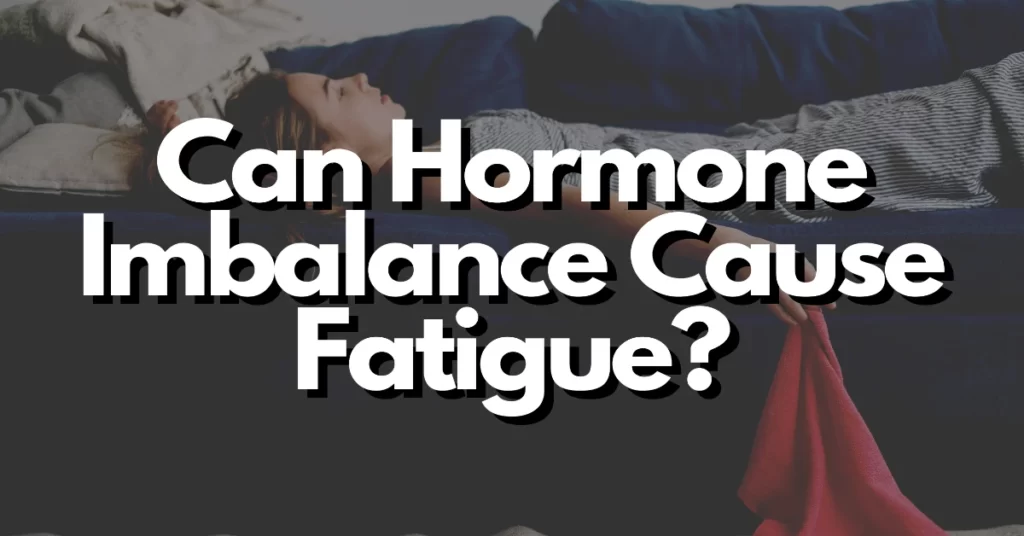Fatigue is a common symptom that many people experience, and hormone imbalance is often considered as one of the potential underlying causes. But can hormone imbalances truly lead to fatigue?
In this blog post, we will explore the relationship between hormone imbalance and fatigue, examining the hormonal factors that can contribute to feelings of exhaustion. Understanding the connections between hormones and fatigue can help you identify and address any underlying imbalances, leading to improved energy levels and overall well-being.

Table of Contents
The Role of Hormones in Energy Regulation and Fatigue Management:
Hormones play a crucial role in energy regulation and fatigue management. Hormones like cortisol, thyroid hormones, and sex hormones influence the body’s metabolism, energy production, and overall vitality.
Cortisol, known as the “stress hormone,” helps regulate energy levels throughout the day, peaking in the morning to promote wakefulness and gradually declining towards evening to facilitate restful sleep. Thyroid hormones, such as thyroxine (T4) and triiodothyronine (T3), regulate the body’s metabolic rate and energy production.
Imbalances in these hormones, such as hypothyroidism or adrenal fatigue, can lead to chronic fatigue and reduced energy levels. Similarly, reproductive hormones like estrogen and testosterone can impact energy and fatigue levels, particularly during menstrual cycles or hormonal changes in menopause or andropause.
Understanding the role of hormones in energy regulation is essential for identifying and addressing imbalances that contribute to fatigue. Working with healthcare professionals to assess hormone levels and develop personalized treatment plans can help restore energy and vitality.
Uncovering the Impact of Thyroid and Adrenal Imbalances on Fatigue Levels:
Thyroid and adrenal imbalances can have a significant impact on fatigue levels. The thyroid gland produces hormones that regulate metabolism, energy production, and overall bodily functions. Hypothyroidism, characterized by an underactive thyroid, can lead to persistent fatigue, low energy levels, and a feeling of sluggishness.
On the other hand, adrenal imbalances, such as adrenal fatigue or dysfunction, can disrupt the production of cortisol, the hormone involved in stress response and energy regulation. Adrenal imbalances often result from chronic stress, and they can contribute to fatigue, sleep disturbances, and reduced stamina.
Uncovering the impact of thyroid and adrenal imbalances on fatigue levels is crucial for accurate diagnosis and effective management. Healthcare professionals can evaluate hormone levels, conduct diagnostic tests, and develop tailored treatment plans to address these imbalances and alleviate fatigue symptoms, restoring energy and overall well-being.
Investigating the Influence of Reproductive Hormones on Fatigue Symptoms:
Reproductive hormones, such as estrogen and progesterone in women, and testosterone in both men and women, can influence fatigue symptoms. Hormonal changes during the menstrual cycle, pregnancy, or menopause can lead to fluctuations in energy levels and feelings of fatigue.
For instance, premenstrual syndrome (PMS) often includes fatigue as a common symptom due to changes in estrogen and progesterone levels. Pregnancy-related hormonal shifts can also contribute to fatigue, particularly during the first and third trimesters. In menopause, declining estrogen and progesterone levels can lead to increased fatigue and reduced vitality.
Similarly, imbalances in testosterone levels can affect energy levels in both genders. Investigating the influence of reproductive hormones on fatigue symptoms helps individuals understand the underlying hormonal factors contributing to their fatigue and seek appropriate support and management strategies.
Managing Hormone-Related Fatigue: Strategies for Restoring Energy and Vitality:
Managing hormone-related fatigue requires a comprehensive approach to restore energy and vitality. Here are some strategies for effectively managing hormone-related fatigue:
- Balance hormone levels: Consult with healthcare professionals to evaluate hormone levels and develop treatment plans tailored to address hormonal imbalances. Hormone replacement therapy or other interventions may be recommended to restore hormonal equilibrium.
- Prioritize sleep: Ensure adequate sleep duration and quality by practicing good sleep hygiene. Establish a regular sleep schedule, create a comfortable sleep environment, and adopt relaxation techniques to promote restful sleep.
- Manage stress: Chronic stress can contribute to hormonal imbalances and fatigue. Implement stress management techniques such as mindfulness, meditation, deep breathing exercises, and engaging in enjoyable activities to reduce stress levels.
- Maintain a balanced diet: Opt for a nutrient-rich diet that supportsenergy levels and hormone balance. Include a variety of fruits, vegetables, whole grains, lean proteins, and healthy fats. Avoid excessive consumption of processed foods, sugary snacks, and caffeine, which can disrupt energy levels and hormone regulation.
- Regular exercise: Engage in regular physical activity to boost energy levels and promote hormone balance. Choose activities that you enjoy, such as walking, cycling, yoga, or strength training. Be mindful of your energy levels and adjust the intensity and duration of exercise accordingly.
- Seek support: Connect with healthcare professionals, such as endocrinologists or naturopathic doctors, who specialize in hormone balance. They can provide guidance, monitor hormone levels, and offer personalized treatment plans to address fatigue related to hormonal imbalances.
- Practice self-care: Prioritize self-care activities that promote relaxation and rejuvenation. This can include hobbies, taking breaks, spending time in nature, and engaging in activities that bring joy and reduce stress.
Conclusion
Hormone imbalances can indeed contribute to feelings of fatigue, but it is important to consider that fatigue can also be caused by various other factors, including lifestyle choices, medical conditions, and psychological factors. Hormonal conditions such as hypothyroidism, adrenal fatigue, and reproductive hormone imbalances can disrupt energy regulation and lead to fatigue.
If you experience persistent fatigue or suspect a hormone imbalance, it is advisable to consult with a healthcare professional for proper evaluation and treatment. Addressing underlying hormonal imbalances, adopting a healthy lifestyle, managing stress, and getting adequate rest can help improve energy levels and alleviate fatigue.
Remember, individual experiences and underlying conditions can vary, so seeking professional guidance is essential in identifying and addressing the specific hormonal factors contributing to your fatigue.

